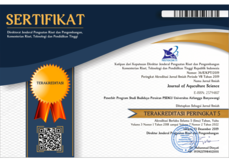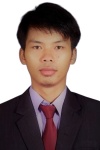Aquaculture Base Group (ABG) as an Effort to Develop a Sustainable Fisheries Economy
Downloads
Indonesia has enormous potential in the field of fisheries, this is because about 70% of its territory is oceans and archipelagic countries. Shrimp farming in Indonesia is a practice that is widely practiced by Indonesians. This is because shrimp is a fishery commodity that has the highest demand. Aquaculture Base Group (ABG) aims to manage communities, who were originally individuals in managing ponds to become groups, because it will make it easier to get support from the government and get more benefits than only individuals. The program is implemented using several methods, namely socializing the importance of cultivation using the ABG method, explaining the advantages of using the ABG method, forming cadres for coordination between extension agents and the community so that communication can be evenly distributed, and distribution for each pond and job desk. As well as the holding of monitoring and evaluation, whether to get more efficient results when using ABG or individual methods. The ABG method is more efficient than using the individual method, including fry and feed can be purchased at a lower price, fry can be done together so that supervision will be easier, management of water sources is more maintained, and biosecurity is easier, and the impact of management be the responsibility of groups not individuals. Conclusion: the use of ABG cultivation method is more efficient, get affordable prices when buying fry and feed, disease management that can be managed together, cheaper electricity, easier biosecurity and more maintained water management (Tandon and Waste Water Treatment Plant) .
Keyword : Fishery, shrimp farming, group, sustainable
Agus. (2021). Pelatihan BP3. Jala Tech: Banyuwangi
Bappenas. (2019). Rancangan Teknokratik Rencana Pembangunan Jangka Menengah Nasional 2020 - 2024: Indonesia Berpenghasilan Menengah - Tinggi Yang Sejahtera, Adil, dan Berkesinambungan. Kementerian PPN/ Bappenas, 313. https://doi.org/10.1017/CBO9781107415324.004
Fatmawati, F. (2019). Meningkatkan Pemahaman Masyarakat dalam Sosialisasi Bahaya Cemaran Logam Berat Pada Kosmetik. Jurnal Pemikiran Agama Dan Pemberdayaan, 19(1), 73–84. https://jurnal.unimed.ac.id/2012/index.php/jkss/article/view/8771
Fauzi, A., Haluan, J., & Boer, M. (2007). Di Provinsi Nanggroe Aceh Darussalam ( NAD ) 1. Jurnal Ilmu-Ilmu Perairan Dan Perikanan Indonesia, 14(1), 73–80.
Haliman, R. W., & S, D. A. (2019). Udang Vanname. Jurnal Ilmu-Ilmu Agribisnis, 7(979–484), 74–75.
Hermawan, A., Amanah, S., & Fatchiya, A. (2017). Partisipasi Pembudidaya Ikan dalam Kelompok Usaha Akuakultur di Kabupaten Tasikmalaya. Jurnal Penyuluhan, 13(1), 1. https://doi.org/10.25015/penyuluhan.v13i1.12903
Kuswanti, I. D. (2017). Peran pengurus kelompok tani tambak "tirta anugrah” bagi pemberdayaan ekonomi anggota di dusun ngentak poncosari srandakan bantul ringkasan skripsi. Universitas Negeri Jogjakarta.
Lindriati, S. (2019). Pengaruh Sosialisasi Dan Tingkat Pemahaman Masyarakat Terhadap Minat Pembuatan Akta Kematian Di Desa Purworejo. FAKULTAS KEGURUAN DAN ILMU PENDIDIKAN, Universitas Lampung, 53(9), 1689–1699.
Prabowo, R. G. M. (2019). Manajemen Strategi. https://doi.org/10.31227/osf.io/xu37y
Prayogi, Ahmad Rido'i Yuda, Hardini, P. P., Alamiyyah, M., Indah, K. S., Haqi, D. N., & Sari, J. D. E. (2020). Determining Of Student Depression Level In The Covid-19 Pandemic Period (Case Study Of Airlangga University Students, Surabaya). Journal of Community Mental Health and Public Policy, 4(1), 1–7.
Prayogi, Ahmad Rido'i Yuda, Tualeka, A. R., Ahsan, A., Rahmawati, P., Russeng, S. S., & Susilowati, I. H. (2020). The Determination of Safe Concentration of Non-Carcinogenic Toluene in Surabaya Printing. The Indonesian Journal Of Occupational Safety and Health, 9(3), 360. https://doi.org/10.20473/ijosh.v9i3.2020.360-368
Rahma, H. N., Prayitno, S. B., & Haditomo, A. H. C. (2014). Infeksi White Spot Syndrom Virus (Wssv) Pada Udang Windu (Penaeus Monodon Fabr.) Yang Dipelihara Pada Salinitas Media Yang Berbeda. Journal of Aquaculture Management and Technology, 3(3), 25–34.
Sa'adah, W., & Milah, K. (2019). Permintaan Udang Vannamei (Litopenaeus Vannamei ) Di Kelompok Pembudidaya Udang At-Taqwa Paciran Lamongan. Jurnal Pemikiran Masyarakat Ilmiah Berwawasan Agribisnis, 5(2), 243–251.
Soebjakto, S. (2020). Strategi pengembangan bisnis budidaya udang. Kementerian Kelautan Dan Perikanan.
Soemarmi, A., & Diamantina, A. (2019). Konsep Negara Kepulauan Dalam Upaya Perlindungan Wilayah Pengelolaan Perikanan Indonesia. Masalah-Masalah Hukum, 48(3), 241. https://doi.org/10.14710/mmh.48.3.2019.241-248
Tjahjaningsih, W. (2020). Menggelorakan Pariwisata Bahari Di Daerah 3T. Fakultas Perikanan Dan Kelautan Universitas Airlangga.
Utami, R., Supriana, T., & Ginting, R. (2014). Analisis faktor-faktor yang mempengaruhi produksi tambak udang sistem ekstensif dan sistem intensif. Journal of Agriculture and Agribusiness Socioeconomics, 3(2), 1–10.
Utami, T. (2019). Pemberdayaan Komunitas Sektor Informal Pedagang Kaki Lima (Pkl), Suatu Alternatif. Journal Sosiologi, 25(2), 114–123.
Vardavas, C. I., & Nikitara, K. (2020). COVID-19 and smoking: A systematic review of the evidence. In Tobacco Induced Diseases (Vol. 18, Issue March, pp. 1–4). https://doi.org/10.18332/tid/1



















